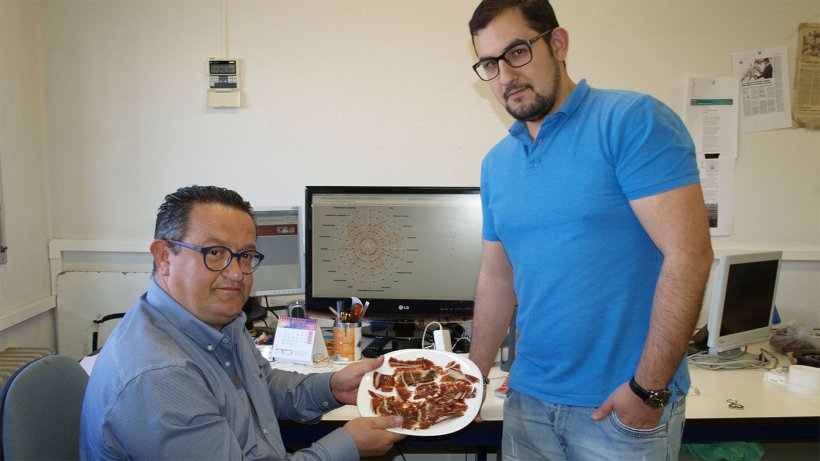 The University of Salamanca has developed a project that allows the tasting of Iberian ham using a system based on artificial intelligence that determines the attributes of the product, just as a professional taster does. The technology of near infrared (NIR) reveals ham's properties and send them to an internet platform, where thanks to artificial neural networks the result is transformed into an analysis of sensory qualities that can be visualized through graphics.
The University of Salamanca has developed a project that allows the tasting of Iberian ham using a system based on artificial intelligence that determines the attributes of the product, just as a professional taster does. The technology of near infrared (NIR) reveals ham's properties and send them to an internet platform, where thanks to artificial neural networks the result is transformed into an analysis of sensory qualities that can be visualized through graphics.
"The project's objective is to ensure that the tasting process takes place over the whole production, which guarantees the quality of the ham for the consumers" explains Vidal Moreno, researcher at the Department of Informatics and Automation and responsible of this initiative, called Ham Taste, which has the support of the Guijuelo Designation of Origin.

"We have to bear in mind that the value of a piece of 100% Iberian acorn-fed ham is several hundred Euros and that an analysis of all the production batches is unfeasible, so they raised the need to develop a process that allows obtaining these estimates without leading to the destruction of the piece and that is economically viable, "he explains.
The problem of sensory tastings is that they are expensive processes because well-trained panels of tasters are needed and involve cutting the pieces. Therefore, today, when the Designation of Origin organizes tastings, only a general evaluation of the batches takes place to guide the consumer on quality features.
However, now "we intend to introduce the tasting process in the control system so that it is useful to the industry and the consumer. Our design does not destroy the piece as it is based on direct experimental technologies and in the cloud", comments the expert. With the new system, the analysis just required cutting a small piece of the bottom ham to be performed.
The research is based on previous experiences, in particular, a system developed to taste cheeses that was the first work regarding food quality assessment developed by this research team in collaboration with the Department of Analytical Chemistry, Nutrition, and Bromatology and with the Food Technology area of the Higher Polytechnic School of Zamora.
Evaluation of very varied aspects
"We launched a series of tests with NIR technology, which has a proven to be useful to determine many properties of food," says the expert. Cheese analysis results were very positive in terms of sensory parameters estimates. However, ham presents added difficulties: its origin is heterogeneous and the product itself has very different parts in the same piece. In short, it is necessary to assess a variety of aspects, such as lean, fat, veining, texture, smell and taste, among others.
Both in the first project and in the new one, artificial intelligence allows emulating the behavior of a human taster thanks to artificial neural networks, an automatic learning, and processing system inspired by the human nervous system.
"The process begins with professional tasters," says Juan Alberto García Esteban, also a researcher in the project. "They introduce their valuations into the system. Then the platform shows different graphics so that companies quality experts can know if the ham is within the expected parameters, "he adds.

A system that continuously improves its estimates
The evaluations of the tasters serve to train the neural networks that, later, based on new measurements of the NIR technology, allows to predict in an artificial way the sensory attributes of the Iberian hams. As the amount of data entered into the system increases, estimates improves.

The system aims to speed up the process while maintaining the current tastings, but virtually, in the cloud and in a distributed way, that is, with different people in different places, all instantly and online. The platform, called i-Taster, makes all data available immediately and from anywhere.
Researchers have developed a proof of concept of this technology thanks to a call from the General Foundation of the University of Salamanca, which has the support of the TCUE program from Castilla y León regional government and with the backing of the Denomination of Origin Guijuelo and the Agricultural Technology Institute of Castilla y León (Itacyl).
June 8, 2018 - dicyt




